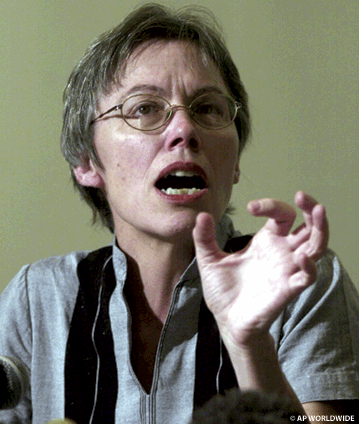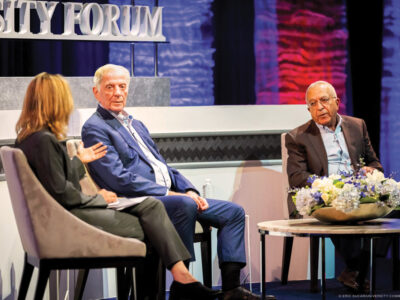
Class of ’74 | When Sidney Jones C’74 G’76 and a colleague from the International Crisis Group (ICG) were ordered to leave Indonesia last June, support poured out from a broad swathe of the nation’s citizenry, ranging from intellectuals and members of the press to ordinary people—many of whom she did not even know. According to The New York Times, one stranger went so far as to send her a text message on her cell phone that read: “Sidney, sorry for your troubles. Do you want to marry me? The only way you can stay is by being an Indonesian citizen.”
Not everyone mourned her departure. General A.M. Hendropriyono, then-director of the National Intelligence Body (BIN), convinced then-President Megawati Soekarnoputri to expel her—in large part for knowing and writing too much about Indonesia’s Islamic extremists, whose existence had been pointedly ignored by most politicians. An Indonesian commentator—Jusuf Wanandi, co-founder of the Centre for Strategic and International Studies—noted that it was “ironical” that Hendropriyono had orchestrated Jones’ expulsion, since “among Indonesian agencies it is he who really needs her most.”
Jones had been “most helpful to Indonesian intelligence groups with her research, studies, and publications” about Islamic extremism and regional conflicts, Wanandi noted. “She is critical, sometimes brutally so, when she sees abuse and evil committed by the Indonesian leaders on their own people. But she does that for the Indonesia that she really loves.”
Indonesia had not been on Jones’ map when she was earning her degrees in Oriental studies and international relations at Penn. Having specialized in Middle Eastern studies (and having spent a year at Pahlavi University in Iran), she was surprised when the Ford Foundation, her first employer, sent her to Jakarta to examine Islamic education. But it proved a felicitous match. She enrolled in an Islamic boarding school in East Java and quickly made some invaluable contacts, to which she added many more during her 14 years as executive director of the Asia division of Human Rights Watch. In the mid-1980s, as the Indonesia and Philippines researcher at Amnesty International, Jones defended some opponents of the Soeharto (Suharto) government who belonged to Jemaah Islamiyah (JI), the Islamic extremist group later blamed for the 2002 Bali bombings and other anti-Western attacks. “They didn’t advocate violence at that stage,” she told Fresh Air’s Terry Gross. “These people were arrested for subversion, and we championed their cause.”
As a result, when she came to Jakarta with the ICG in 2002 and renewed her contacts with those people, some of whom were in prison, they welcomed her “with open arms” as she gathered information. But she didn’t return their embrace, and instead published a report titled “Al Qaeda in Southeast Asia: The case of the Ngruki Network in Indonesia.” At that point, she told Gross, “these same people decided that I was a traitor.”
Ngruki is the home of an Islamic boarding school that produced so many JI members that Jones has described it as “the Ivy League of Jemaah Islamiyah.” The school’s founder was the militant Muslim cleric Abu Bakar Ba’asyir (Bashir)—who brought a criminal defamation complaint against Jones for having slandered him. Last month, however, he was found guilty for his role in the Bali bombings and sentenced to two years in prison.
Though she was accused of having acted against Indonesia’s “national interests,” her reports helped stir a lively public debate on terrorism, regional conflicts, and other aspects of Indonesian life, and that debate has not died out with her departure. Ironically, “it’s the reaction to our expulsion that has made us optimistic about the prospects for Indonesian democracy,” noted Jones in a commentary for The Wall Street Journal last June. “One Indonesian friend said that it was a testament to how far Indonesia has moved from its authoritarian past that we lasted as long as we did.”
Even after she was expelled, a leading Jakarta newspaper published a front-page cartoon of Jones with her mouth taped shut—a pretty good indication, she noted, that “sardonic commentary on government actions is here to stay.”
Jones recently participated in an email interview with Gazette senior editor Samuel Hughes.
What role did Penn play in preparing you for Indonesia?
It was mostly the push factor—in 1977, after five years in West Philly, I was ready to do anything to get out. I applied for a job with the Quakers in the Gaza Strip and wrote to TV Guide in response to an ad for an editorial assistant, leaving my parents’ telephone number. When they called for an interview, my mother answered and told them that no daughter of hers would ever work for TV Guide, so that was out. I’d seen the announcement about a Middle East position at the Ford Foundation posted in Stiteler Hall and thought I didn’t have a chance. Then I found out that a fellow I.R. student had applied, and I thought, “Well, hell, I’m better than him!” So I applied, got an interview, came in second for the job, and was offered a position in Jakarta. So cockroaches on Locust Street and the cut-throat competition that Penn fosters among its graduate students were key factors.
You clearly love Indonesia—why?
I’ve spent all of my professional life working on the place. I have more friends in Jakarta than any other city in the world. It’s a spectacularly beautiful country. But I guess it comes down to the fact that you love any place that you come to know in depth.
How did you build such an incredible network of contacts in Indonesia?
I never set out to build a network of Important People. But I was 24 when I went to Jakarta, and I started out working with many Indonesians my own age—it’s almost as though we grew up together. One example was the Legal Aid Institute, a Ford Foundation grantee. Of the young lawyers I met then, one is now Attorney General; one is chair of the National Human Rights Commission; one is a defense lawyer for Abu Bakar Ba’asyir; and another is on the board of the International Crisis Group. When I worked for Amnesty International, I came to know many of the brave critics of the Soeharto government who got detained for their beliefs—and those people today range from radical Islamists to members of Parliament. Over the 14 years that I was with Human Rights Watch, I met wonderful people across the country who were trying to change things for the better from Aceh to Papua, and those people have also become friends.
How would you describe the nature of Islam in Indonesia?
There isn’t and never was a single Indonesian Islam, any more than you have a single “Arab” Islam. In one city in Central Java you can find salafi Muslims who look to Saudi mentors and try to
follow seventh-century practices that they see as “pure”; Muslims who blend their faith with traditional Javanese beliefs; Muslims who are themselves pious but who vote for secular parties; and a few radicals who want to blow up U.S. interests. When some observers talk about the “Arabization” of Indonesian Islam, which is a decidedly unhelpful phrase, they tend to mean the first, and when they talk about “Indonesian Islam” they tend to mean the second. But Islam in Indonesia runs the gamut, as you would expect in any country with more than 200 million people. The only things you can say with certainty is that the bombers are the radical fringe of the radical fringe, they’re a tiny fraction of the whole, and their numbers are not growing by leaps and bounds.
What’s your assessment of President Yudhoyono’s performance so far?
Doing better than Megawati is like doing better than Dan Quayle, but Yudhoyono appears to be genuinely committed to resolving conflict in Aceh, strengthening civilian control over the military, tackling corruption, fixing the legal system, and improving the business climate.
It’s too early to say whether actions will match the rhetoric, or whether as president, he will have the stomach for the down-and-dirty fights necessary to take on vested interests.
Terrorism is an interesting issue, because it’s simply not a priority for the Indonesian public—far more people die from other kinds of violence, and there are more pressing economic and social concerns. Most Westerners don’t appreciate how much the Indonesian police have done to arrest members of the JI network, even as top politicians refuse to acknowledge that JI exists. But compared to Thailand or the Philippines, Indonesia’s been a star.
Apart from the obvious, horrible devastation, how has the tsunami affected Indonesia, especially Aceh?
The tsunami has helped put many things in perspective, including terrorism. An American journalist, one of the best analysts of terrorism in the region, told me how difficult he found it covering Aceh in the first week after the disaster. “It wasn’t just the devastation and the bodies,” he said. “It was more the realization that there were hundreds of thousands dead—and there was no villain to blame it on.”
How have U.S. relief efforts affected Indonesia’s longstanding distrust of the U.S.?
The U.S. should be careful about blowing its own horn too loudly. No question the airlifts of emergency supplies and the medical evacuations made possible by U.S. helicopters were deeply appreciated by the Acehnese. But gratitude wanes and suspicion increases with distance from the disaster, and many of the factors generating distrust and dislike of the U.S.—from the war in Iraq to restrictions on visas—have not gone away.
Ironically, U.S. policy towards Indonesia itself is not the problem. It’s U.S. policy towards the rest of the world that causes major headaches in Indonesia, particularly with respect to Iraq and the Arab-Israeli conflict, and now the veiled and not-so-veiled threats to Iran.
The U.S. has lost whatever moral credibility it had with the revelations about Guantanamo and Abu Ghraib and its half-hearted response. The Indonesian government never listened very much to human-rights appeals, but it’s even less inclined to do so now. It doesn’t mean a government that is morally compromised itself should stay silent when abuses occur outside its own borders, but it certainly means that Indonesians are going to resent human-rights lectures from Americans even more than they have in the past.
What was your reaction to being deported, and to the people who supported you?
I was devastated at having to leave—I never really believed it would come to that. I also thought I’d be back in short order, so I left everything in Jakarta when I moved to Singapore: books, paintings, china, even old tax returns. The hardest part was saying good-bye to our two Indonesian staff at the airport. Up until then, it had almost been fun fighting back. But these were two people I loved, and when I hugged them, I didn’t want to let go.
Do you think your deportation backfired for Megawati and Hendropriyono?
I don’t think our deportation did anything to help the Megawati government’s image, but when all was said and done, it didn’t have that much impact. Megawati was going to lose the presidential election anyway, and when she went, so would Hendro. We were deluged with support from around the country, but I never had any illusions that it would be enough to stay the deportation order. Indonesia is a huge, rich, strategically important country. What happens to one foreigner is simply not that important—and I had stepped on a lot of toes.
Do you think you’ll ever be allowed to return?
Not clear at this stage. A friend of mine was on a plane with a Cabinet minister about a week ago and asked him about me. The minister looked at him and said, “Haven’t you noticed Indonesia’s image has improved since she left?”
Are there any hidden benefits to exile?
There are no benefits to exile at all. Singapore is hospitable, efficient, and comfortable, but I’d go back to Jakarta in an instant. —S.H.




